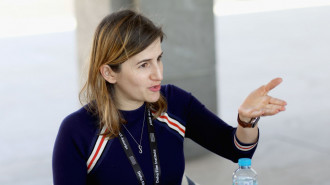
'I was a child... I still am': Public outcry grows in Iraq over proposal to lower legal marriage age to nine

An Iraqi conservative coalition proposed a draft law in August to lower the legal age of marriage to nine.
The discussions that ensued in parliament and on social media have had devastating ramifications on Jihan, whose childhood came to an abrupt end when her father married her against her will at the age of 12 to a man twice her age.
“My father married me off when my mother was travelling,” she told The New Arab. “He took advantage of the situation, but luckily, my mum did not idly stand by.”
Jihan’s mother raised the alarm bills and informed other members of the neighbourhood that the marriage was against Jihan’s will.
The situation became national news when her mother turned to the media and called on former Prime Minister Mustafa al-Kadhimi for help. She responded by sending military forces to locate Jihan and rescue her after spending nearly a month with her husband.
Although the 1959 Personal Status Law established the legal marriage age in Iraq as 18, Jihan’s father took the case to court and managed through a loophole to acknowledge the contract.
Three years have passed since the incident, and Jihan's mother has yet to convince the court to annul the contract. Meanwhile, Jihan, now 15, lives unhappily with her husband.
“He signed under the pretext of ‘protecting me,’” she stated. “I was a child... I still am.”
Jihan’s mother told The New Arab that her daughter continues to suffer from the psychological and physical toll of being forced into marriage as a child.
Her financial situation has worsened, as she has spent all their resources fighting the case in court.
Catastrophic repercussions
In August, in its fifth session of the second legislative term, the Iraqi Parliament held the first reading of the proposed amendments to the Personal Status Law No. 188 of 1959 after voting to add it to the session's agenda.
The 1959 law, enacted soon after the Iraqi monarchy was overthrown, shifted the authority over family matters from religious leaders to the state and its judicial system.
However, now, this legislation appears likely to be undermined by an amendment supported by conservative Shia Muslim parliamentarians, who are calling for the implementation of religious laws.
In late July, the proposed amendments were pulled from parliament due to opposition from many lawmakers, but the powerful Shia blocs that control the chamber proposed the draft a month later.
“The proposed amendments to the current personal status law will allow individuals to choose which legal framework they want to follow when entering into a marriage contract,” Bassem al-Ghirbawi, a member of the Iraqi Parliament, in favour of the draft law, states.
“It will benefit children by reducing divorce rates and preserving the sanctity of the family.”
He told The New Arab that this legal framework, which is applied in countries like Iran and Lebanon, “best respects women’s rights,” balancing the rights of both parties in a marriage.
But rights advocates are worried that these amendments would undermine women's rights and lead to more underage marriages in the country's deeply patriarchal society.
“These amendments go against Article 14 of the Iraqi Constitution, which states that all Iraqis are equal before the law, regardless of gender, race, ethnicity, origin, colour, sect, social or economic status,” lawyer and women’s and children’s rights activist Susan Shankali stated.
“These amendments will have immediate and potentially catastrophic repercussions on the fabric of Iraqi society.”
She argues that the proposed law “undermines public confidence in the Iraqi Parliament,” especially given the allegations of ongoing political bargaining to pass it.
"Many Iraqi laws require amendments to reflect the world's emerging progressive values, especially given Iraq's democratic shift after 2003," said Ali al-Bayati, head of the Human Rights Defenders Organization, to The New Arab.
"The challenge with creating or changing laws after 2003 is that most stakeholders are driven by political motives, with minimal input from experts or community discussions to ensure the laws truly benefit society."
He argues that the proposed amendments to Iraq’s personal status law are “clearly politically motivated.”
"Iraq is facing significant political and security challenges," he explained. "The country and its people have more urgent priorities that must be addressed before considering changes to the personal status law."
He notes that Iraq should prioritise enacting legislation and taking steps that “unite, rather than divide, its citizens.”
“The strong reactions to the proposed amendments highlight the deep divisions they have created,” he said.
There is a genuine need to enact a law that ensures the rights of every citizen, regardless of their religious or sectarian background, argues al-Bayati.
Iraqi women ready to escape if law amended
Iraqi MP Noor Nafi' al-Jalihawi announced in August, a day before calls for the amendments resurfaced, the formation of a parliamentary bloc composed of several female members of parliament to reject the implementation of the draft law.
“We began meeting with political leaders to convey their opposition and outline their reasons for rejecting the amendments, in an effort to preserve the fabric of Iraqi families and protect the rights of all family members — men, women, and children,” she told The New Arab.
She added that the opposition to the amendments was not driven by “emotion or external pressures” but based on “legal, religious, professional, and social concerns rooted in a sincere desire to protect Iraqi families.”
“The bloc has already met with Faiq Zidan, the head of the Supreme Judicial Council, who confirmed that the Council has not been officially informed or provided with any version of the proposed amendments,” she noted.
Jihan and her mother are thinking about escaping Iraq if the law is amended to allow the marriage of minors.
“I cannot bear the thought of what happened to me happening to other girls as well,” she said.
“I feel sorry for Iraq. I can only dream of a future where women’s dignity is preserved as human beings first before they are seen as wives.”
Shahab Al-Sameer is a Yazidi writer and journalist from Sinjar District, Iraq. He is interested in religious minority issues, political affairs, and human rights issues
This article is published in collaboration with Egab






 Follow the Middle East's top stories in English at The New Arab on Google News
Follow the Middle East's top stories in English at The New Arab on Google News


